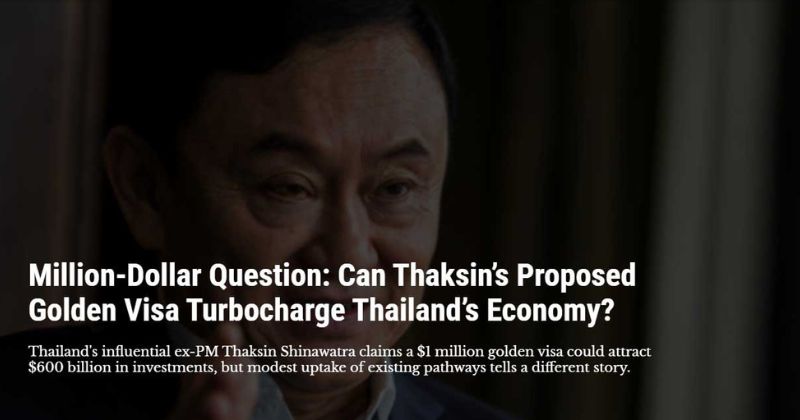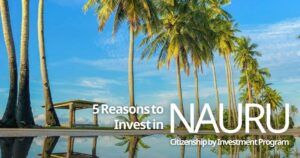Thailand’s influential ex-PM Thaksin Shinawatra claims a $1 million golden visa could attract $600 billion in investments, but modest uptake of existing pathways tells a different story.
Former Thai Prime Minister Thaksin Shinawatra has proposed a new golden visa program to attract 600,000 wealthy foreigners, each contributing US$1 million in exchange for long-term residency and property rights.
Thaksin outlined the initiative at the “Unlocking Thailand’s Future” conference, describing it as a potential economic lifeline that could inject US$600 billion into the economy, more than the country’s current GDP, which stands at about US$515 billion. He suggested the funds could support education, reduce public debt, and stimulate domestic consumption.
The golden visa plan, he added, would boost Thailand’s real estate sector by allowing foreign investors to purchase property. Thaksin also called for Airports of Thailand Plc (AOT) to raise passenger service fees by 40%, which could generate an additional 40 billion baht (US$1.23 billion) annually, which he said would help position Thailand as a regional aviation hub.
The proposal comes as Thailand grapples with slow economic growth, which has averaged under 2% annually over the past decade. High household debt and declining tourist arrivals have further constrained growth. The Tourism Authority of Thailand recently lowered its 2025 foreign arrivals forecast to 35 million.
Thaksin, despite holding no formal government position, continues to exert significant influence on Thai politics. His Pheu Thai Party, currently led by his daughter Paetongtarn Shinawatra, heads the governing coalition.
Thaksin’s influence stems from his enduring popularity among supporters ever since he was ousted in a 2006 coup. His popularity is reportedly evident in rural areas where his policies during his tenure created long-lasting loyalty.
Yet his legal troubles, including a pending royal defamation case, have kept him from holding office directly, although he remains an active figure in shaping Thailand’s political and economic discourse.
Bastien Trelcat, Managing Partner of Harvey Law Group Thailand, described the proposal as ambitious but not without potential, adding that attracting 600,000 applicants within five years is “not impossible”.
He noted that the US$1 million price tag is high compared to existing visa options but said it could attract interest if it includes long-awaited reforms, such as allowing foreigners to secure land ownership or fully own certain types of Thai businesses.
He also pointed to recent financial reforms, including updates to digital banking, cryptocurrency regulations, and tax policies, as indicators of Thailand’s efforts to position itself as a financial hub in the region.
Existing visa programs, such as the Thailand Elite Visa and Long-Term Resident Visa, have continued to perform well, demonstrating that Thailand remains an attractive destination for high-net-worth individuals, added Trelcat.
How Feasible is Thailand’s Proposed Golden Visa?
But questions remain about the feasibility of the plan. Investment migration experts have long asserted that high-net-worth individuals “rarely spend more than 10% of their net worth on an immigration program,” Nuri Katz, founder of Apex Capital Partners, recently stated to Forbes.
As it stands, approximately 2.3 million people worldwide hold a net worth of US$10 million or more, making the potential pool of applicants for Thailand’s proposed golden visa relatively small. Thailand would have to attract nearly a quarter of these individuals to hit the US$600 billion target.
Additionally, Thailand already offers long-term residency options at a significantly lower cost, which have seen an uptake of fewer than 10,000 applicants annually.
Citizenship pathways remain restricted, and most foreigners become naturalized through marriage, rather than investment. This may limit the appeal of long-term residency for some investors unless potential golden visa legislation directly addresses this roadblock.
Legal restrictions on foreign land ownership could also pose challenges. While Thaksin’s proposal includes the possibility of property rights for foreigners, current laws prevent outright ownership in most cases. Whether the initiative will address these restrictions remains unclear.
Disclaimer: The content on this website is provided for general informational purposes and should not be interpreted as legal, financial, or professional advice. While we make every effort to ensure the information is accurate and current, some details may be subject to change or may not be fully up to date. We do not accept liability for any actions taken based on the information presented.





